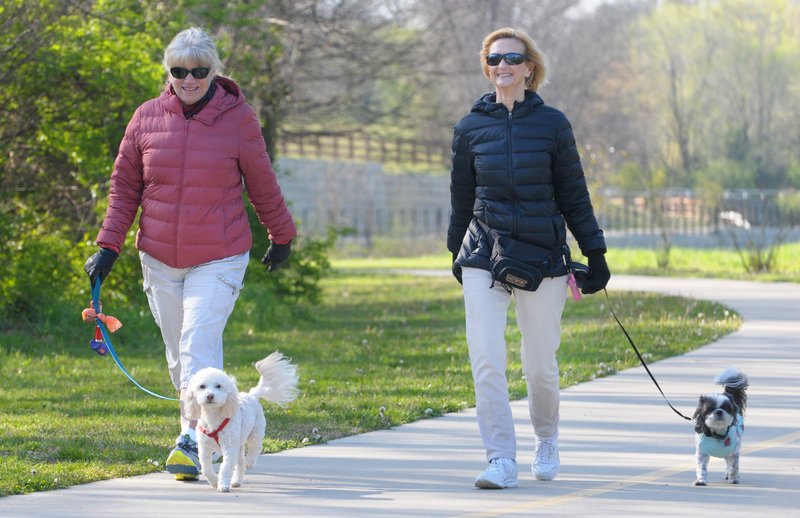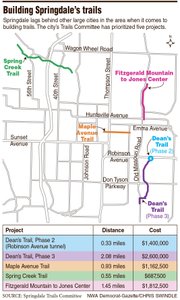SPRINGDALE -- Dean LaGrone spends about an hour each day on the trails in and around town.
"It's a way to disconnect from the stress of your job, of life," said the hiker and cyclist, who also serves on the city's Trails Committee. "One hour on the trail is a good way to reduce stress. It's a lifestyle."
The city's master plan for trails shows them crossing in all directions and creating a loop around the city. The city counts 13.5 miles of trail, including the Razorback Greenway and in parks. Another 10 miles will be added when an NWA Trailblazers' mountain bike course opens in May on Fitzgerald Mountain.
Springdale lags behind other cities in Northwest Arkansas when it comes to trails, although the description of a "trail" varies. Bentonville and Rogers officials each report 50 miles of trails, paved and natural surface. Fayetteville has 81.
Matt Mihalevich, trails coordinator for Fayetteville, said the difference is Fayetteville and Rogers started building trails earlier.
"And Bentonville has had a lot of success with private donors," he added.
Springdale pays for trails with grants and money it receives from a statewide 0.5 percent sales tax for roads and alternate forms of transportation. The city received $6.2 million in road tax money over the past five years, according to a city report.
Most of the money was spent on projects other than trails, the report shows. The fund provided $92,220 for the East Emma Avenue streetscape project last year, for example. The largest share of the turnback money was used to support Ozark Regional Transit, which received a 43 percent increase from $160,000 in 2013 to $265,000 in 2017.
The city paid $89,000 in 2015 to reroute the Razorback Greenway to Lake Springdale, and $352,000 went to the engineering of Dean's Trail from 2015 to 2017, the report shows.
"Quite honestly, we have to prioritize quite differently than other cities," Springdale Mayor Doug Sprouse said. "We have a tight budget, and it's a balancing act to put money into projects that spur development. Our recent history has focused on street infrastructure, but a lot of the new streets include a trail with them. Maybe now we can make a more focused effort and take advantage of the opportunity to build pieces of the trails."
The city will be able to dedicate $2 million to trails this year, with another $2 million for the Emma streetscape project, Sprouse said. Both will come from money saved in the Capital Improvement Fund, said Wyman Morgan, the city's director of administration and finance.
Dean's trail
LaGrone has spent more than a few hours on the trails. He walked and drove the eastern side of Springdale to determine the path for a trail to run east of Old Missouri Road. "The route just seemed to make sense to me," he said.
The City Council on Tuesday night will consider a $2.9 million bid from Emery Sapp & Sons of Missouri to build the first phase of the trail. It's been named "Dean's Trail."
"Usually, you have to pay a lot of money to get your name on a trail," LaGrone said. "It was the 'Eastside Trail,' but people started referring to it as 'Dean's Trail,' and it just kind of stuck."
The Planning Department will ask for approval to apply for a $500,000 grant from the Arkansas Department of Transportation to help pay for the second phase.
Phase 1 will run south from the Razorback Greenway at The Jones Center to West Robinson Avenue. This also will be the first lighted multi-use trail in the city, said Steve Hatfield, trails coordinator.
"It runs through an open industrial area," LaGrone said. "Then it goes through the neighborhood by Parson Hills Elementary."
He noted the trail ultimately will connect the neighborhood to J.O. Kelley Middle School and Linda Childers Knapp Elementary School, giving children safe routes. The trail also will connect to Northwest Technical Institute.
LaGrone said Phase 1 should be completed by the end of the year. The City Council has not approved money for Phase 2, an underpass of Robinson Avenue at Oriole Street near Fire Station 5, and Phase 3, through open land along creek drainage to Lake Fayetteville.
Down the road
The Trails Committee has prioritized three other projects in addition to Dean's Trail: a bike lane in the street and widened sidewalks on Maple Avenue from Murphy Park to Luther George Park; Spring Creek Trail from J.B. Hunt Park to 40th Street, connecting to the trails of the Arkansas Game and Fish Commission's planned education center; and another bicycle lane from Fitzgerald Mountain to The Jones Center, connecting a planned mountain bike trail to the Razorback Greenway.
Sprouse added one more: a bike lane along Watkins Avenue with a pedestrian lane added to the overpass of Interstate 49. This would connect the overlay district, including Arkansas Children's Northwest, Arvest Ballpark and the planned Northwest Arkansas Community College campus to nearby neighborhoods and Randal Tyson Recreational Complex.
"New development will continue to come in and around the area with the trail supportive in making a connection," Sprouse said.
A pedestrian lane crossing I-49 will be expensive, said Chris Weiser, chairman of the Trails Committee. The Pride Trail project, connecting Springdale High School and Har-Ber High School, was dropped from the committee's priority list because the cost of building a pedestrian bridge across the interstate would be prohibitive, he said.
The city also asked if a $500,000 federal grant administered through the state Transportation Department for the Pride Trail can be redirected to Dean's Trail, Hatfield said.
Springdale has received $4.5 million in grant money for trails, with $3.2 million used to build Walter Turnbow Park. The Thunder Chicken mountain bike trail off Silent Grove Road was funded at $1 million.
Most of the prioritized trail projects will be less than a mile long, but vital for connections, especially to the Razorback Greenway, Weiser said.
"It takes $1 million to build one mile of trail," he added, quoting a number he heard at a PlacesForBikes conference last year in Madison, Wis.
Measuring Support
The Advertising and Promotion Commission took a poll of city residents to see if they would support adding a 1 percent sales tax to the price of restaurant meals, commonly known as a "hamburger tax," said Perry Webb, president of the Springdale Chamber of Commerce. Bentonville and Fayetteville collect this tax.
The Gilmore Strategy Group of Little Rock surveyed 300 residents by phone during the first week of December, Webb said.
Asked if they would support the tax for parks and trails, 47 percent said yes and 45 percent no. Webb said the support wasn't enough to pass a referendum.
"That does not mean we will give up on the hope of having a trail system," Webb said. "But we are going to have to figure out a revenue source for trails to be prepared for the future."
The trails in Northwest Arkansas have become a draw from people across the state and from the surrounding region. The Slaughter Pen Mountain Bike Trail at Bentonville and Kessler Mountain Trail in Fayetteville have been big draws. Supporters expect the same of the Fitzgerald Mountain trails in Springdale.
The Slaughter Pen Jam bike race will move to Fayetteville this year, renamed the Kessler Mountain Jam, the Fayetteville Tourism Bureau announced Wednesday. This has been the largest mountain bike race in the state.
Mihalevich expects his city to benefit from those who travel to the race and spend money for food and lodging. Fayetteville taxes hotel and restaurant expenditures and dedicates part of the revenue to parks, he said.
The recent study by the Walton Family Foundation and PeopleForBikes showed bicycling pumped $137 million into Northwest Arkansas last year, including $27 million in tourism dollars.
"The bar keeps going higher for the quality of trails," Mihalevich said. "People need to see what we have here. I hope Springdale can build trails, so they can benefit from it."
NW News on 04/23/2018



